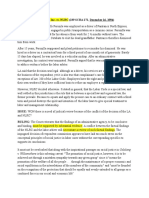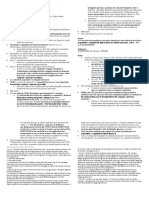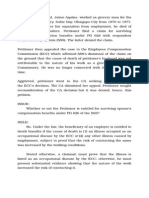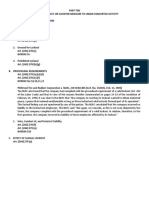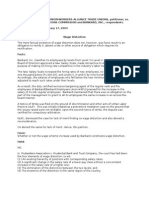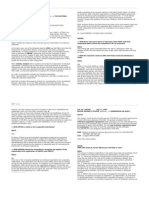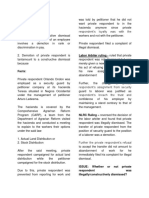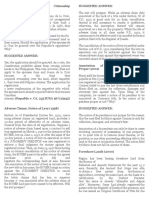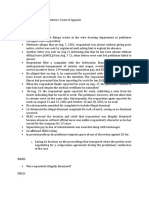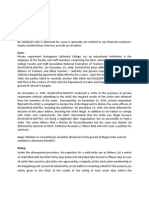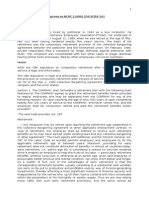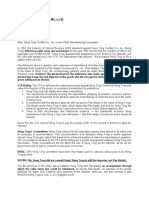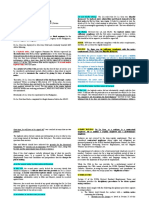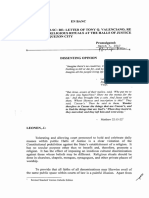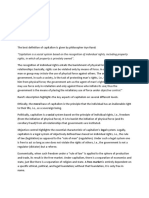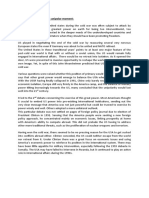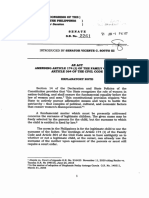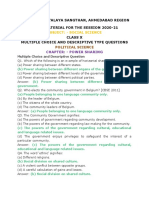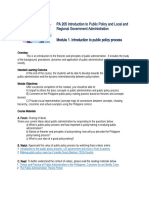GUEVARRA ISSUE: W/N the CBA provision allowing compulsory retirement before
CBA – Interpretation, Administration and Enforcement (Nature) age 60 but after 25 years of service legal and enforceable, and thus, Suñiga
was not illegally dismissed
PANTRANCO NORTH EXPRESS v. NLRC RULING: Yes, it is legal and enforceable. Suñiga was not illegally
G.R. No. 95940 | July 24, 1996 | Panganiban dismissed.
Petitioners: PANTRANCO NORTH EXPRESS, INC. Article 287 of the Labor Code (now Article 302) permits employers and
employees to fix the applicable retirement age at below 60 years.
Respondents: NATIONAL LABOR RELATIONS COMMISSION and Moreover, providing for early retirement does not constitute diminution of
URBANO SUÑIGA benefits.
Doctrine: A CBA incorporates the agreement reached after Early retirement (before age 60) is considered a reward for services
negotiations between employer and bargaining agent with respect to rendered, since it enables an employee to reap the fruits of his labor
terms and conditions of employment. A CBA is not an ordinary (particularly retirement benefits) at an earlier age, when said employee,
contract. As a labor contract, it is not merely contractual in nature, but who is presumably better physical and mental condition, can enjoy them
impressed with public interest. Thus, it must yield to the common better and longer.
good.
One of the advantages of early retirement is that the retirement benefits
FACTS (usually in cash) can be put to productive and profitable uses by way of
income-generating investments, thereby affording a more significant
In 1964, Urbano Suñiga (Suñiga) was hired by Pantranco North Express, measure of financial security and independence for the retiree.
Inc. (Pantranco) as a bus conductor. He eventually joined the Pantranco
Employees Association-PTGWO (Union). The parties to the CBA are bound not only to the fulfillment of what has
been expressly stipulated, but also to all the consequences which
Suñiga continued in Pantranco’s employ until 1989, when he was retired at according to their nature, may be in keeping with good faith, usage and law.
the age of 52 after having rendered 25 years of service. The basis of his It binds not only the union, but also its members.
retirement was the compulsory retirement provision of the CBA between
Pantranco and the Union. Suñiga received retirement pay. A CBA incorporates the agreement reached after negotiations between
employer and bargaining agent with respect to terms and conditions of
Suñiga then filed a complaint for illegal dismissal. The LA rendered employment. A CBA is not an ordinary contract. As a labor contract, it is
judgement in favor of Suñiga, ruling that there was illegal dismissal. The not merely contractual in nature, but impressed with public interest. Thus,
NLRC affirmed the ruling of the LA. it must yield to the common good.
Pantranco contends that the provision in the CBA on compulsory retirement As such, it must be construed liberally, rather than narrowly and
after 25 years of service is valid and in consonance with the Labor Code. technically. Courts must place a practical and realistic construction upon
Furthermore, Suñiga is a union member, thus, he is bound by the CBA. The it, giving due consideration to the context in which it is negotiated and
CBA’s terms and conditions constitute the law between the parties. purpose which it is intended to serve.
Being a product of negotiation, the CBA between Pantranco and the Union
intended the provision on compulsory retirement to be beneficial to the
�employees-union members, including Suñiga. When Suñiga ratified the
CBA with the Union, he not only agreed to the CBA, but also agreed to (5) Upon reaching the age of sixty (60) years or upon completing twenty-
conform to and abide by its provisions. Thus, he was not illegally five (25) years of service to the COMPANY, whichever comes first, and the
dismissed when the CBA provision on compulsory retirement was applied employee shall be compulsory retired and paid the retirement benefits
to his case. herein provided."
Furthermore, R.A. No. 7641 (Retirement Pay Law) amended Article 287 of
the Labor Code (now Article 302). The intention and spirit of the
Retirement Pay Law is to give employers and employees a free hand to
determine and agree upon the terms and conditions of retirement.
Thus, providing in a CBA for compulsory retirement after 25 years of
service is legal and enforceable, so long as the parties agree to be
governed by such CBA. The law presumes that employees know what
they want and what is good for them, absent any showing that fraud or
intimidation was employed to secure their consent.
OTHER ISSUE AND RULING: The LA has jurisdiction over the
complaint, not the VA or the panel of arbitrators.
Only disputes involving the union and the company shall be referred to the
grievance machinery or voluntary arbitrators. In this case, it cannot be said
that the “dispute” is between the Union and Pantranco, because both have
previously agreed upon the provision on compulsory retirement in the CBA.
Also, it was only Suñiga, on his own, who questioned the compulsory
retirement. Thus, the case is properly denominated as a “termination
dispute” which comes under the jurisdiction of the LA.
OTHER NOTES
Article XI, Section 1 (e)(5) of the May 2, 1989 CBA between Pantranco and
the Union states:
Section 1. The COMPANY shall formulate a retirement plan with the
following main features: xxx xxx xxx
(e) The COMPANY agrees to grant the retirement benefits herein provided
to regular employees who may be separated from the COMPANY for any
of the following reasons: xxx xxx xxx



